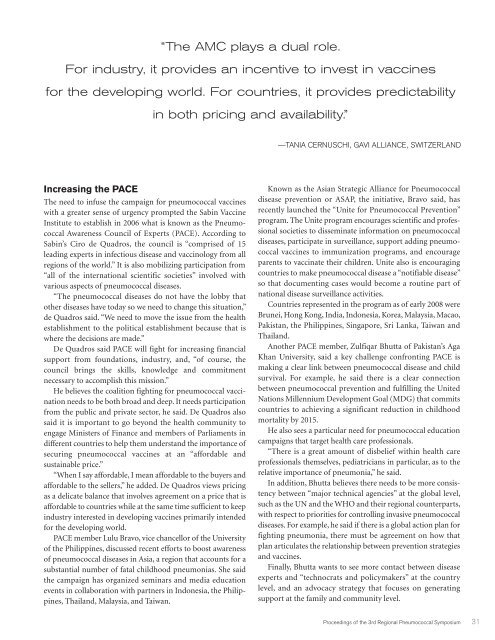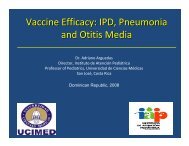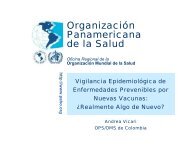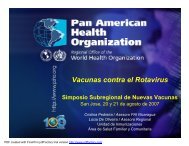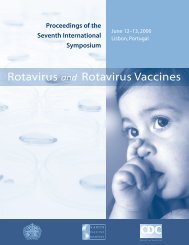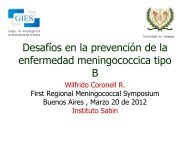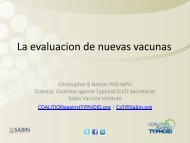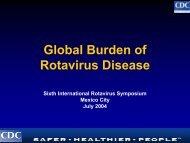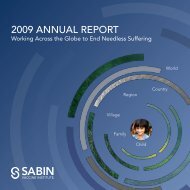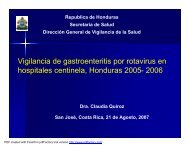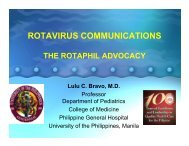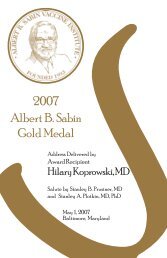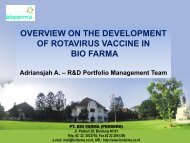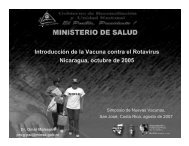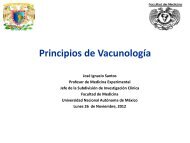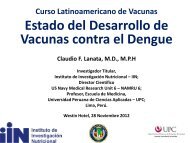3rd Pneumococcal Symposium web - Sabin Vaccine Institute
3rd Pneumococcal Symposium web - Sabin Vaccine Institute
3rd Pneumococcal Symposium web - Sabin Vaccine Institute
You also want an ePaper? Increase the reach of your titles
YUMPU automatically turns print PDFs into web optimized ePapers that Google loves.
“The AMC plays a dual role.<br />
For industry, it provides an incentive to invest in vaccines<br />
for the developing world. For countries, it provides predictability<br />
in both pricing and availability.”<br />
—TANIA CERNUSCHI, GAVI ALLIANCE, SWITZERLAND<br />
Increasing the PACE<br />
The need to infuse the campaign for pneumococcal vaccines<br />
with a greater sense of urgency prompted the <strong>Sabin</strong> <strong>Vaccine</strong><br />
<strong>Institute</strong> to establish in 2006 what is known as the <strong>Pneumococcal</strong><br />
Awareness Council of Experts (PACE). According to<br />
<strong>Sabin</strong>’s Ciro de Quadros, the council is “comprised of 15<br />
leading experts in infectious disease and vaccinology from all<br />
regions of the world.” It is also mobilizing participation from<br />
“all of the international scientific societies” involved with<br />
various aspects of pneumococcal diseases.<br />
“The pneumococcal diseases do not have the lobby that<br />
other diseases have today so we need to change this situation,”<br />
de Quadros said. “We need to move the issue from the health<br />
establishment to the political establishment because that is<br />
where the decisions are made.”<br />
De Quadros said PACE will fight for increasing financial<br />
support from foundations, industry, and, “of course, the<br />
council brings the skills, knowledge and commitment<br />
necessary to accomplish this mission.”<br />
He believes the coalition fighting for pneumococcal vaccination<br />
needs to be both broad and deep. It needs participation<br />
from the public and private sector, he said. De Quadros also<br />
said it is important to go beyond the health community to<br />
engage Ministers of Finance and members of Parliaments in<br />
different countries to help them understand the importance of<br />
securing pneumococcal vaccines at an “affordable and<br />
sustainable price.”<br />
“When I say affordable, I mean affordable to the buyers and<br />
affordable to the sellers,” he added. De Quadros views pricing<br />
as a delicate balance that involves agreement on a price that is<br />
affordable to countries while at the same time sufficient to keep<br />
industry interested in developing vaccines primarily intended<br />
for the developing world.<br />
PACE member Lulu Bravo, vice chancellor of the University<br />
of the Philippines, discussed recent efforts to boost awareness<br />
of pneumococcal diseases in Asia, a region that accounts for a<br />
substantial number of fatal childhood pneumonias. She said<br />
the campaign has organized seminars and media education<br />
events in collaboration with partners in Indonesia, the Philippines,<br />
Thailand, Malaysia, and Taiwan.<br />
Known as the Asian Strategic Alliance for <strong>Pneumococcal</strong><br />
disease prevention or ASAP, the initiative, Bravo said, has<br />
recently launched the “Unite for <strong>Pneumococcal</strong> Prevention”<br />
program. The Unite program encourages scientific and professional<br />
societies to disseminate information on pneumococcal<br />
diseases, participate in surveillance, support adding pneumococcal<br />
vaccines to immunization programs, and encourage<br />
parents to vaccinate their children. Unite also is encouraging<br />
countries to make pneumococcal disease a “notifiable disease”<br />
so that documenting cases would become a routine part of<br />
national disease surveillance activities.<br />
Countries represented in the program as of early 2008 were<br />
Brunei, Hong Kong, India, Indonesia, Korea, Malaysia, Macao,<br />
Pakistan, the Philippines, Singapore, Sri Lanka, Taiwan and<br />
Thailand.<br />
Another PACE member, Zulfiqar Bhutta of Pakistan’s Aga<br />
Khan University, said a key challenge confronting PACE is<br />
making a clear link between pneumococcal disease and child<br />
survival. For example, he said there is a clear connection<br />
between pneumococcal prevention and fulfilling the United<br />
Nations Millennium Development Goal (MDG) that commits<br />
countries to achieving a significant reduction in childhood<br />
mortality by 2015.<br />
He also sees a particular need for pneumococcal education<br />
campaigns that target health care professionals.<br />
“There is a great amount of disbelief within health care<br />
professionals themselves, pediatricians in particular, as to the<br />
relative importance of pneumonia,” he said.<br />
In addition, Bhutta believes there needs to be more consistency<br />
between “major technical agencies” at the global level,<br />
such as the UN and the WHO and their regional counterparts,<br />
with respect to priorities for controlling invasive pneumococcal<br />
diseases. For example, he said if there is a global action plan for<br />
fighting pneumonia, there must be agreement on how that<br />
plan articulates the relationship between prevention strategies<br />
and vaccines.<br />
Finally, Bhutta wants to see more contact between disease<br />
experts and “technocrats and policymakers” at the country<br />
level, and an advocacy strategy that focuses on generating<br />
support at the family and community level.<br />
Proceedings of the <strong>3rd</strong> Regional <strong>Pneumococcal</strong> <strong>Symposium</strong> 31


